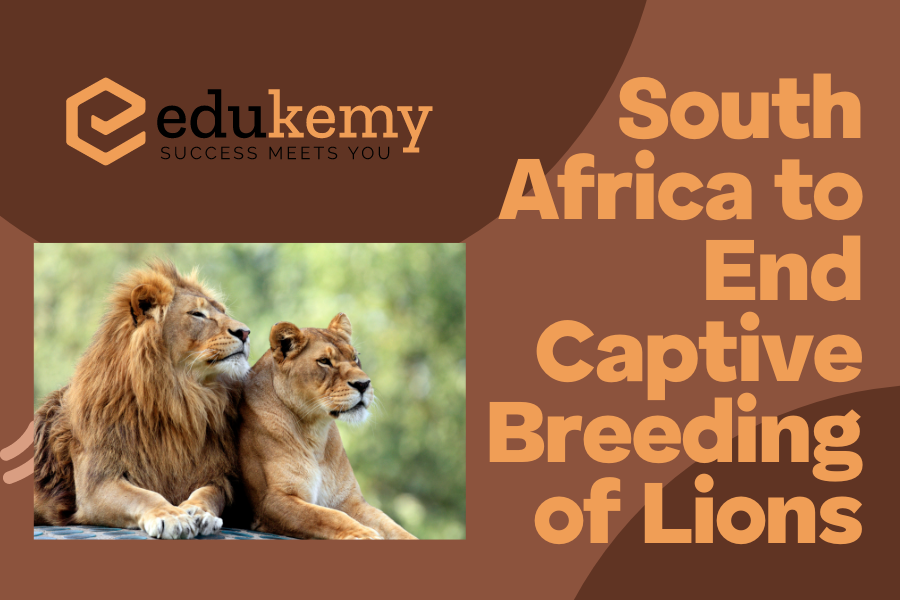
South Africa is phasing out the captive breeding of lions, used for trophy hunting and body parts, aiming for a complete ban within two years. This decision follows years of criticism from conservationists.
Tags: GS Paper – 3 – Environment and ecology- Conservation
Contents
Context:
- South Africa’s decision to halt captive lion breeding, driven by concerns about trophy hunting and lion bone usage in traditional Chinese medicine, marks a significant shift in wildlife conservation.
The Key Traits of Lions:
- Two subspecies of lions exist in the wild: the African lion (Panthera leo leo) and the Asiatic lion (Panthera leo persica).
- While African lions once roamed across much of Africa, they are now primarily found in sub-Saharan Africa, with the majority residing in eastern or southern Africa.
- Asiatic Lions inhabit the Gir National Park and Wildlife Sanctuary in Gujarat, India.
- Although visually similar, there are distinctions between the two subspecies. Male Asiatic lions typically exhibit darker, shorter manes compared to African lions.
- Furthermore, both male and female Asiatic lions are generally smaller in size than their African counterparts.

- Habitat: Lions are nocturnal creatures that inhabit a range of environments, favouring grassland, savanna, dense scrub, and open woodland.
- Social Structure: Lions exhibit a highly social behaviour, forming prides consisting of related females, their offspring, and a few adult males known as a coalition. Lionesses typically undertake hunting duties, while dominant males defend the pride’s territory.
- Hunting and Diet: As apex predators, lions primarily prey on large ungulates like wildebeest, zebra, and antelope. They employ cooperative hunting strategies, utilising agility and teamwork to capture prey. Lions are also opportunistic scavengers, often scavenging kills from other predators.
- Threats: Lions face various threats including habitat loss, fragmentation, climate change, and dwindling prey populations. They are also targeted by trophy hunters seeking body parts as trophies or souvenirs, posing additional risks to their survival.
- Conservation Status:
- IUCN Red List: Vulnerable
- CITES: Appendix I
- Wildlife Protection Act 1972: Schedule I

Note:
- In India, Project Lion envisages landscape ecology based conservation of the Asiatic Lion in Gujarat by integrating conservation and eco-development. The Gujarat government has planned to translocate 40 adult and sub-adult lions to the Barda Wildlife Sanctuary in the state, according to a 2023 report by Wildlife Institute of India (WII).
UPSC Civil Services Examination, Previous Year Question
Prelims:
Q:1 Consider the following statements: (2019)
- Asiatic lions are naturally found in India only.
- Double-humped camels are naturally found in India only.
- One-horned rhinoceros is naturally found in India only.
Which of the statements given above is/are correct?
(a) 1 only
(b) 2 only
(c) 1 and 3 only
(d) 1, 2 and 3
Ans: (a)
Q.2 Recently there was a proposal to translocate some of the lions from their natural habitat in Gujarat to which one of the following sites? (2017)
(a) Corbett National Park
(b) Kuno Palpur Wildlife Sanctuary
(c) Mudumalai Wildlife Sanctuary
(d) Sariska National Park
Ans: (b)
FAQs on South Africa Ending Captive Lion Breeding
- Is South Africa banning the breeding of lions in captivity?
There isn’t a complete ban yet, but the South African government recently announced a significant step towards ending the captive breeding of lions for commercial purposes.
- Why is South Africa taking this action?
Concerns surround the ethics of such breeding practices. Critics argue these facilities often exploit lions for tourist activities like cub petting and canned lion hunting, raising welfare issues.
- Does this mean all captive lions will be released?
No, the plan focuses on stopping the breeding, not releasing existing lions. The future management of these animals is still under discussion.
- Will this affect tourism in South Africa?
The impact on tourism remains to be seen. Supporters of the ban believe it will promote responsible tourism focused on wild lion conservation.
- What happens next?
The South Africa government needs to develop regulations to enforce the captive breeding ban. This will likely take time, with details on the exact timeline and implementation yet to be announced.
In case you still have your doubts, contact us on 9811333901.
For UPSC Prelims Resources, Click here
For Daily Updates and Study Material:
Join our Telegram Channel – Edukemy for IAS
- 1. Learn through Videos – here
- 2. Be Exam Ready by Practicing Daily MCQs – here
- 3. Daily Newsletter – Get all your Current Affairs Covered – here
- 4. Mains Answer Writing Practice – here

